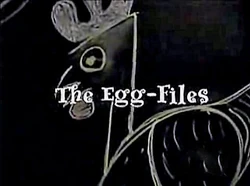| "The Egg-Files" | |
|---|---|
|
Series |
|
|
Season |
1 |
|
Episode |
3 |
|
Theme |
|
|
Recipes |
|
|
Production Number |
EA1A03 |
|
Airdate |
July 21, 1999 |
| Episode Chronology | |
|
Previous |
|
|
Next |
|
| Related Titles | |
|
Next |
|
Alton Brown cracks the mysterious egg case and pursues a higher understanding of the amazing ovoid's culinary powers. How to land a non-stick pan, scramble, over easy--and consider eggs for dessert.
Summary[]
Alton states that chickens lay at least one egg every 25 hours, 365 days a year. A rooster is not required. The yolk is pure nourishment high in fat, vitamins, and minerals. The white provides physical support and bacterial protection with salts, proteins and liquids. At processing plants, eggs are bathed, sanitized, and candled. A trained eye or computer spots blood, air sacs or fractures. Egg grading is a voluntary process and the United States Department of Agriculture is paid to do it. Inspector Sullens states that eggs come in grades of Double-A, A-Grade, and B-Grade, Double-A being the youngest.
Alton says to keep your eggs refrigerated at 40 degrees will keep your eggs fresh. Keep your eggs in the carton, not the egg slots to prevent breaking. If your hard cooking eggs, tie a rubber band around the carton a put it on its side. The yolks will stay centered. We've all become afraid of undercooked eggs because of salmonella. Most restaurants won't serve eggs over easy anymore. Dr. Penny Adcock states that 1 in 10,000 to 20,000 eggs are infected. She recommends to cook eggs to in between 170 and 175 degrees, which will overcook them.
Alton melts butter, which goes good with an eggs flavor, in a non stick skillet. He states it's not for preventing it from sticking. Use a heat proof spatula, which have red handles. Never use metal. When the butter starts to foam, he cracks the egg in and waits for the white to set. He sprinkles some sea salt, not kosher salt, and some pepper. He flips the egg by popping his wrist, and sets it on to the plate. A angry short order cook wonders why Alton's in the dinner. Alton shows him that a raw eggs spins but a cooked one doesn't. He crushes the raw one in anger.
Alton states eggs won't stick on a non stick skillet and make sure it isn't cheap. Scrambled eggs' magic lies in the egg. Alton melts butter on medium heat. He cracks the egg on the counter, not the bowl or the pan, which could leave egg shell. He states you can add milk or cream, not more than a tablespoon per egg. Add salt right before the eggs enter the pan. He starts the eggs really low and stirs untill they coagulate. He states that eggs cooked over high heat lose moisture. The curds begin to form and he cranks up to high. He folds the curds around and shakes the pan until no more liquid can be seen, and serves. He says if it looks done in the pan, it will be overcooked on the plate.
Alton says that a yolk has the ability to hold on liquids, turning them into a gel we call custard. A lemon custard is a curd. He brings water in a pan to a simmer on medium. He says the flavor of a lemon is in the skin. If you go too deep, it's the nasty pith. Using a peeler, you'd have to chop it. With a bar grater, the skins get in your teeth. He uses a wood rasp. In a bowl, he adds lemon zest and juice with water. He adds sugar and egg yolks. He wisks until it's smooth. He wisks non stop when the water simmers. He states a double boiler uses consistent heat so you don't make scrambled eggs. He ends up with a custard that coats a spoon. He works in butter one piece at a time. He says it will last a month refrigerated with plastic wrap over it to prevent a film. You can put it in a pie shell or put it on pound cake.
Alton says the secret to boiling a egg is to not boil it at all. He starts the eggs in cold water with salt. He brings the pot to a boil and removes it from the heat. He leaves it for fiffeen minutes with the lid on. He drains the water and bangs the eggs around in the pot. He puts them in ice water to stop the cooking.
Facts[]
- A dozen large eggs weighs from 24 to 26 ounces.
- An egg shell is over 90% calcium carbonate. It's as strong as bone.
- Teflon, an American invention, was first applied to a pan by a Frenchman.
- 1945 was America's egg eating year with 402 consumed per capita.
Cast[]
Dr. Penny Adcock ... Epidemiologist (Herself)
Steve Rooney ... Short Order Cook
Harold Sullens ... USDA Egg Grader (Himself)
Ingredients[]
Butter, Cream, Egg, Eggwhite, Egg yolk, Hollandaise, Kosher salt, Lemon, Lemon juice, Lemon zest, Mayonnaise, Milk, Pepper, Pie shell, Salt, Sea salt, Soft boiled egg, Sugar, Water
Tools[]
None
Techniques[]
Boiling, Flipping, Folding, Grinding, Simmering, Whisking
Terminology[]
Curd, Custard, Grade, Hen, Juice, Pith, Rooster, Soufflé
Science[]
Acid, Bacteria, Calcium carbonate, Coagulation, Cup (measurement), Emulsification, Epidemiology, Fat, Irradiation, Minerals, Napper, Oil, Proteins, Salmonella, Salts, Tablespoon (measurement), Teaspoon (measurement), Teflon, Vitamins
Organizations[]
Culture[]
1945, America, American, France, Ralph Waldo Emerson, Rocky, Scot
Visual Aids[]
Locations[]
Title Origin[]
The X-Files
